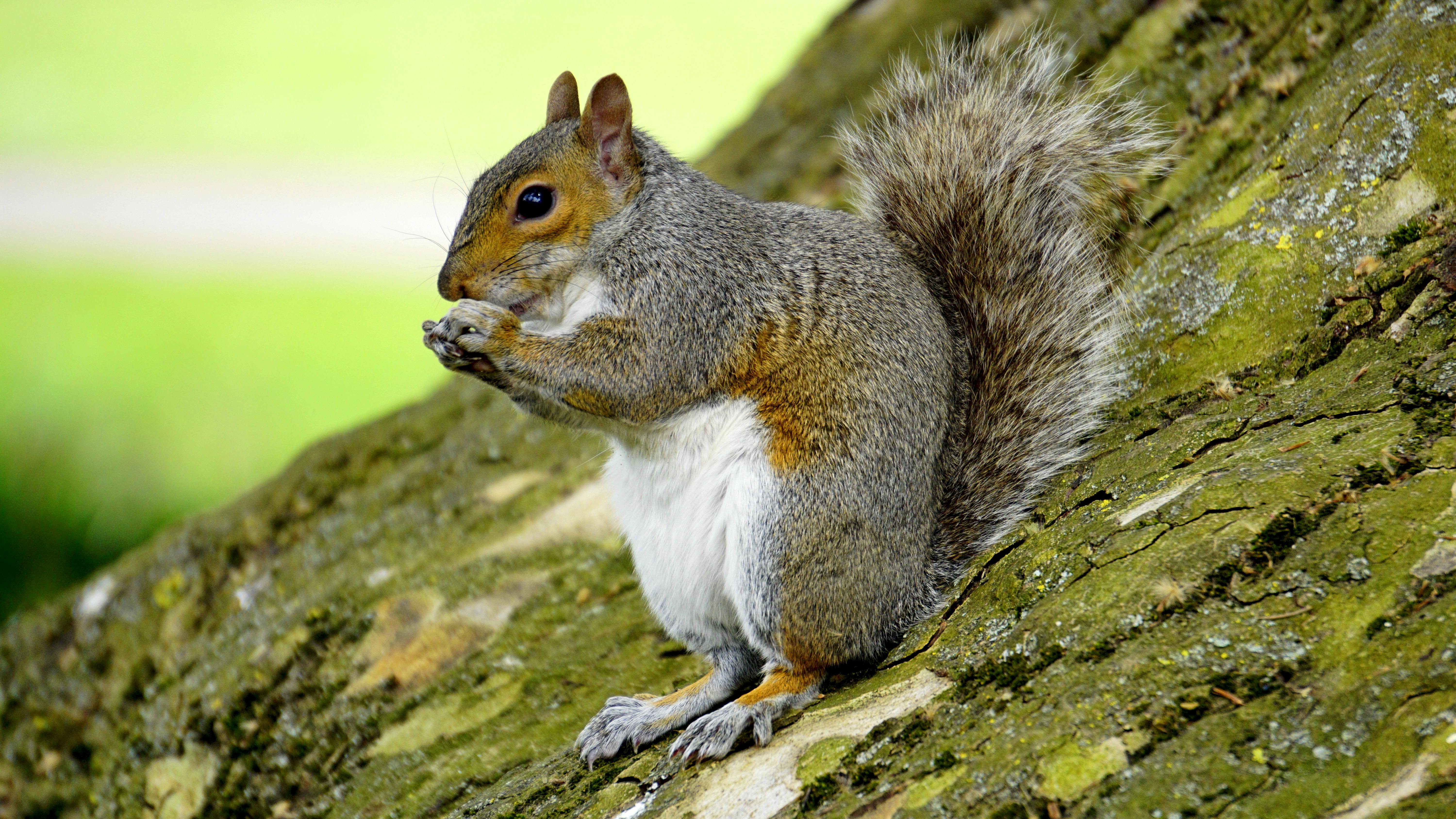Can Squirrels Get Rabies? Understanding the Risk

Introduction to Squirrels and Rabies
Squirrels are small, bushy-tailed rodents commonly found in various habitats worldwide. They are known for their quick movements, acrobatic abilities, and fondness for nuts and seeds. These agile creatures often inhabit parks, forests, and urban areas, coexisting alongside humans.
Rabies is a viral disease that affects the central nervous system of mammals, including humans. It's a serious concern because it can be fatal if not treated promptly. The virus is typically transmitted through the saliva of an infected animal, commonly through bites or scratches. Given the potential danger, it's natural to wonder: Can squirrels get rabies? or Can squirrels carry rabies?
Assessing the Risk
According to the Centers for Disease Control and Prevention (CDC), while squirrels are indeed mammals and theoretically susceptible to rabies, instances of them contracting the disease are rare. This is because squirrels, unlike certain other mammals like raccoons or bats, are less likely to come into contact with rabid animals or engage in behaviors that increase their risk of exposure.
Understanding Wildlife Transmission
Rabies primarily spreads through the bite of an infected animal. In the case of squirrels, interactions with potentially rabid animals such as raccoons, foxes, or bats would pose the greatest risk. However, such encounters are relatively uncommon due to differences in behavior and habitat preferences.
Can squirrels carry rabies? Understanding Rabies

Rabies is a deadly viral disease that affects mammals, including humans. It can have severe neurological effects and is considered a zoonotic disease, meaning it can be transmitted from animals to humans.
What is Rabies?
Rabies is caused by the rabies virus, which belongs to the family Rhabdoviridae. This virus primarily affects the central nervous system of mammals, leading to inflammation in the brain. The most common way rabies spreads is through the bite of an infected animal.
Effects of Rabies on Mammals
Once the rabies virus enters the body, it travels along the nerves towards the brain. This journey can take weeks or even months, during which time the infected individual may not show any symptoms. However, once the virus reaches the brain, symptoms begin to manifest.
Symptoms of Rabies
Symptoms of rabies in mammals vary but often include:
- Agitation and aggressiveness
- Confusion and disorientation
- Excessive salivation (known as "foaming at the mouth")
- Difficulty swallowing
- Fear of water (known as hydrophobia)
Rabies Transmission
Rabies is typically transmitted through the saliva of an infected animal, most commonly via a bite. However, it can also be transmitted through scratches or other breaks in the skin that come into contact with infected saliva. In rare cases, rabies transmission can occur through exposure to infected respiratory secretions or tissue.
Common Carriers of Rabies
Various animals can carry and transmit the rabies virus, including:
- Raccoons
- Bats
- Skunks
- Foxes
- Dogs
- Cats
These animals are known as reservoirs for the virus, meaning they can maintain and spread it within their populations.
Rabies Prevention and Control
Preventing rabies in humans primarily involves vaccination. Vaccinating domestic animals, such as dogs and cats, helps control the spread of the disease to humans. In cases of potential exposure to rabies, post-exposure prophylaxis (PEP) can prevent the onset of symptoms.
Rabies is a serious and potentially fatal disease that affects mammals worldwide. Understanding the symptoms, transmission, and common carriers of rabies is crucial for both preventing its spread and seeking appropriate medical treatment if exposure occurs. Organizations like the World Health Organization (WHO) play a vital role in educating the public and implementing strategies to control rabies globally.
Can squirrels have rabies?

Unlikeliness of Squirrels as Carriers
While it's technically possible for squirrels to get rabies, it's exceedingly rare. This is due to several factors related to their biology and behavior.
Squirrel Immune System and Behavior
Squirrels possess a robust immune system that can often fight off infections, including the rabies virus. Additionally, their behavior typically doesn't put them at high risk of encountering rabid animals. They tend to avoid confrontation with potential carriers of the virus, such as raccoons or bats, which reduces their exposure.
Statistics from the CDC
According to data from the Centers for Disease Control and Prevention (CDC), instances of rabies in squirrels are exceedingly rare. The CDC tracks rabies cases across the United States, and while there are cases of rabies in wildlife, including bats, raccoons, and foxes, instances involving squirrels are minimal.
Insights into Unlikely Carriers
- Despite their widespread presence in urban and rural environments, squirrels are not significant vectors for rabies transmission.
- Their cautious behavior and efficient immune systems contribute to their low likelihood of contracting and transmitting the virus.
- While it's important to exercise caution around wildlife and seek medical attention if bitten or scratched, the risk of contracting rabies from a squirrel is very low.
By understanding the dynamics of rabies transmission and the biology of squirrels, we can better appreciate the rarity of squirrels contracting and spreading the virus.
Signs of Rabies in Squirrels
Rabies in squirrels is rare, but it's crucial to understand the signs to stay safe. Remember, always approach any encounter with wild animals with caution, even if they seem harmless.
Unusual Behaviors to Watch Out For
When observing squirrels, keep an eye out for any unusual behaviors. These could be signs of rabies or other illnesses. Some key behaviors to watch for include:
- Lethargy: If a squirrel appears unusually tired or sluggish, it could be a sign of illness, including rabies.
- Disorientation: Squirrels are typically agile and alert creatures. If you notice one seeming confused or lost, it's a cause for concern.
- Aggression: While squirrels may exhibit defensive behaviors in certain situations, unprovoked aggression could indicate rabies.
Importance of Caution
It's crucial to emphasize the importance of caution when encountering squirrels or any wild animals. Approaching a potentially rabid animal can be dangerous, as rabies can be transmitted through bites or scratches.
Always maintain a safe distance and avoid attempting to handle or interact closely with squirrels exhibiting unusual behaviors. Instead, contact local animal control or wildlife authorities for assistance.
While rabies in squirrels is uncommon, it's essential to remain vigilant and aware of the signs. By recognizing unusual behaviors and exercising caution, you can help protect yourself and others from potential rabies exposure. Remember, safety always comes first when interacting with wildlife.
What to Do If You Encounter a Rabid Animal?
Encountering a rabid animal, whether it's a squirrel or any other creature, can be alarming. It's crucial to know how to respond safely and responsibly. Here's what you need to do:
1. Avoid Approach or Contact
Rabid animals can behave unpredictably and aggressively. Do not attempt to approach or handle the animal, regardless of how harmless it may seem. Maintain a safe distance to protect yourself from potential harm.
2. Ensure Pet Vaccination
Regular vaccination of your pets is essential in preventing the transmission of rabies. By keeping your furry friends up-to-date on their vaccinations, you greatly reduce the risk of them contracting the disease from encounters with infected animals.
3. Report to Authorities
Promptly report any encounter with a potentially rabid animal to the appropriate authorities. This could include animal control services or local wildlife authorities. Providing information about the location and behavior of the animal can help authorities take necessary precautions to prevent further incidents.
4. Seek Immediate Medical Attention
If you are bitten or scratched by a wild animal, seek medical attention without delay. Even if you're unsure whether the animal is rabid, it's crucial to err on the side of caution. Rabies is a serious and potentially fatal disease, but prompt medical treatment, including vaccination, can prevent its onset.
Encountering a rabid animal can be a frightening experience, but knowing how to respond can make all the difference. By avoiding contact, ensuring pet vaccination, reporting incidents, and seeking medical attention when necessary, you can protect yourself and your community from the dangers of rabies.
Remember, swift action is key when dealing with potentially rabid animals. Stay safe, stay informed, and prioritize your well-being and that of your pets.
Conclusion
In conclusion, while technically possible, rabies in squirrels is extremely uncommon. Their natural behavior and immune system make them unlikely carriers of the virus.
Always prioritize your safety and report any encounters with potentially rabid animals to animal control or your local wildlife authorities. If bitten or scratched by any wild animal, regardless of species, seek immediate medical attention.
Frequently Asked Questions (FAQ'S)
Q. Do squirrels get rabies?
Yes, squirrels can get rabies, although it's not very common. They can contract the virus through bites from infected animals or contact with saliva.
Q. Can squirrels carry rabies?
Yes, squirrels can carry rabies if they have been infected. While transmission to humans is rare, it's still important to avoid contact with potentially rabid animals.
Q. How common is rabies in squirrels?
Rabies is relatively rare in squirrels compared to other animals. However, it's still possible for them to contract and spread the virus, so caution is advised.
Q. Can you get rabies from a squirrel?
Yes, it's possible to get rabies from a squirrel if it's infected with the virus. Avoid handling or approaching wild squirrels, especially if they're behaving strangely.
Q. Can squirrels have rabies?
Yes, squirrels can have rabies if they've been exposed to the virus. While they're not common carriers, it's still crucial to take precautions around potentially infected animals.
Q. What do squirrels with rabies look like?
Squirrels with rabies may exhibit unusual behavior such as aggression, disorientation, and paralysis. They might also froth at the mouth due to difficulty swallowing.
Q. Can I get rabies from a squirrel bite?
Yes, if the squirrel is infected with rabies, a bite could transmit the virus. Seek medical attention immediately if bitten by any wild animal.
Q. Does Indian squirrel have rabies?
While Indian squirrels can potentially carry rabies if infected, cases are relatively rare. However, it's important to exercise caution around any wild animal, especially if they're acting strangely.
Q. Does squirrel bite need rabies vaccine?
If bitten by a squirrel, it's important to seek medical attention promptly. A healthcare provider will assess the risk and determine if a rabies vaccine is necessary based on the circumstances.
Q. Does squirrels have rabies?
Yes, squirrels can have rabies if they've been infected. While it's not common, it's crucial to take precautions and avoid contact with potentially infected animals.
Q. Can you get rabies from a squirrel scratch?
While the risk is lower compared to a bite, it's still possible to contract rabies from a squirrel scratch if the animal is infected. Prompt medical attention is advisable in such cases.
